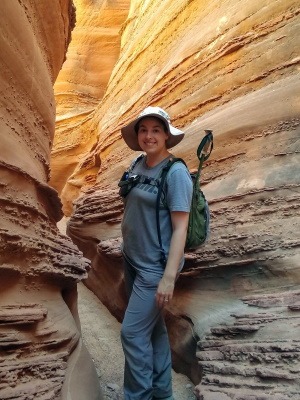Social Work Spotlight: Meet Assistant Professor Kess Ballentine
 Wayne State University was a perfect fit for Assistant Professor Kess Ballentine, PhD. Raised in the small-chocolate filled community of Hershey, Pennsylvania, Kess was looking for an urban university steeped in diverse community engaged research that works hand-in-hand with its members to advance social justice on a macro level. Kess found just what she was looking for in the heart of Detroit. Prior to becoming a Warrior, Kess earned an undergraduate degree in health policy and administration with a minor in economics from Penn State University and a master of arts in teaching – special education from North Carolina State. While at the University of Pittsburg, Kess earned a master of social work and doctorate of social work.
Wayne State University was a perfect fit for Assistant Professor Kess Ballentine, PhD. Raised in the small-chocolate filled community of Hershey, Pennsylvania, Kess was looking for an urban university steeped in diverse community engaged research that works hand-in-hand with its members to advance social justice on a macro level. Kess found just what she was looking for in the heart of Detroit. Prior to becoming a Warrior, Kess earned an undergraduate degree in health policy and administration with a minor in economics from Penn State University and a master of arts in teaching – special education from North Carolina State. While at the University of Pittsburg, Kess earned a master of social work and doctorate of social work.
Why did you choose to come to WSU?
I love that as a faculty member I can live, teach, and do impactful community research right in Detroit. I also love our diverse student body and that I have the opportunity to integrate macro social work practice and research with my teaching.
What is your area of research focus?
I focus on how working conditions affect low-paid workers’ lives, particularly parents of elementary-aged youth. I hope to call employers’ attention to the far-reaching effects of poor working conditions and workplace discrimination while also helping social workers and school districts acknowledge how parents’ paid labor affects parents and their relationships with their children’s schools. Good working conditions can help improve child and family well-being!
How does your research impact the Detroit community?
Many Detroiters are working in low-paying jobs with few benefits while raising their children. Meanwhile, we live in a city with relatively limited social infrastructure, such as efficient transit. As we continue to pursue equity in Detroit, improving working conditions and achieving labor and economic justice are key ingredients to improve our community well-being and that of families and children!
What is your favorite class to teach?
I love teaching, so picking a favorite course is difficult! I think teaching policy is a real passion of mine, as I think many social workers dread their policy course. I love to teach it in a way that helps social work students understand why policy is so important, how they can be involved, and how they can understand the inherent challenges, injustices, and limitations of our public policy using a critical lens. Students who leave my policy classes understand how policy can dismantle or reinforce oppressive structures from the federal policy level down to day-to-day implementation at local agencies and be prepared to examine their own role in policy creation and implementation.
Any advice for current students?
To the extent possible, use your assignments as tools to learn more about the topics that made you pursue a social work degree, such as substance misuse, community violence, unemployment, etc. Do you have to write a paper or reflect on community service? Then match the paper topic or the community agency to the social problem that matters most to you, or use or assignments to explore a few different social problems.
Across each class try to identify the tools you are putting in your “tool belt.” This will make your course work and class activities more meaningful. See your group projects and the challenges therein as opportunities to enhance your teamwork and interpersonal communication skills. Consider how writing a paper with careful attention to detail prepares you for the careful writing required to write grants to fund your future agency. Practice your research skills knowing you will have to show evidence of impact of interventions or find answers to detailed social program questions posed by your clients.
Any advice for graduates?
Stay connected to the people in the professional network you built during school. As social workers many of us specialize but, since most social problems are inter-related, we often need to know a quick answer to something far outside our area of expertise. By having a strong and expansive professional network – which you can start building during school – you can get a question answered by an expert colleague as quick as you can send an email or text!
What is one thing that others may not know about you?
I have a goal to visit all the national parks, and I am an avid, self-taught quilter!
View more Social Work Warrior profiles.